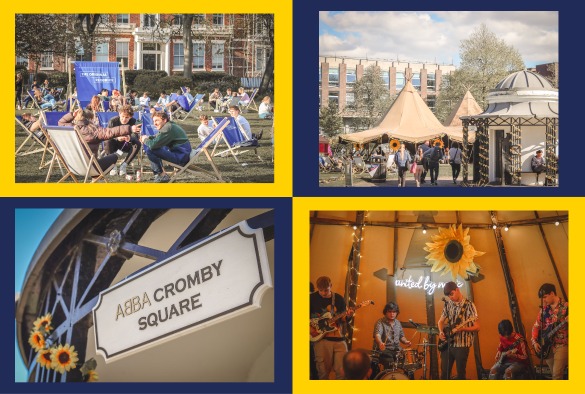Liverpool was United by Music for the 2023 Eurovision Song Contest.
With campus dressing, student learning opportunities and lots of singing, the University of Liverpool played a key role in contributing to this significant event.
The party may be over, but the memories remain vivid and now the work begins to understand Eurovision’s impact. The University’s Rhiannon Corcoran, Professor of Psychology and Public Mental Health, is leading on a study that will evaluate the impact of events on the wellbeing and sense of community of local residents. Kateryna Zhuk, an intern research fellow from Ukraine’s Sumy State University, has been supporting Prof Corcoran’s work. Read a blog written Kateryna here.
Looking back…
On campus
In the weeks leading up to the competition, the University had a make-over, with sunflowers, the national flower of Ukraine, adorning lampposts and buildings across campus. The iconic Abercromby Square was even renamed ‘ABBAcromby Square’ in tribute to the 1974 Eurovision winners and this was the hub location for a jam-packed programme of events for students to enjoy a range of events including music performances and craft activities.
Campus dressing also celebrated the University’s rich musical heritage with a timeline, taking people on a journey through the ages.
Meanwhile, local artist Paul Curtis set to work creating a new commission resulting in a new mural on campus that calls for peace in Ukraine and symbolises the University’s pairing with Sumy State University. Read more about Paul’s work here and find out more about the University’s relationship with Sumy State here.
Education
The University’s educational activities included the Mini Eurovision concert at the Tung Auditorium, the culmination of a programme involving 16 primary schools across the city region in learning languages through music, in partnership with Resonate. Read the full news story and see photographs from the event here.
Meanwhile, the University’s Heseltine Institute continued its programme of dedicated policy briefings, covering topics including:
- The relationship between LGBTQ+ communities and Eurovision
- An exploration of how hosting the event could help to address some of the challenges facing Liverpool’s live music industry.
Tung Auditorium
As well as Mini Eurovision, the University of Liverpool’s state-of-the art Tung Auditorium hosted a series of Eurovision and Ukraine themed events including; LUMSOVISION: A Celebration of Euro-Pop Through the Decades, Poetry in a Time of Crisis and the Grand Final Live Screening. Significantly the Tung presented the Eurovision Preview Gala, where audiences had the chance to see Ukrainian singer Polina Hrechyshkina and contemporary dancer Iryna Kuts from Sumy State University and the Eurovision entries from Georgia, Iceland and Lithuania – just days before their final performances. Some University students even had the chance to meet the Eurovision performers.
The University and the City
A University Eurovision singing pod located in Liverpool ONE was a huge hit with Eurovision revellers and saw a few famous faces taking up the mic including Radio 2 DJ Richie Anderson.
The University played a key role in the largest exhibit of Ukrainian photography in the UK. Delivered in partnership with Open Eye Gallery, academics and students contributed new writing to the project and was complemented by an app designed by the University. Read more about Home here.
University academics also took part in events including A Stat for Europe: Statistics of the Eurovision Song Contest which delved into the links between maths, statistics, and Eurovision. Professor Lisa Shaw also took part in the Late at the Tate Liverpool: The Spirit of Eurovision.
Liverpool UNI-ty Choir sang on the Eurovision Village main stage. Made up of University staff, students, and members of the local community they performed a range of material including gospel-inspired songs, a piece written in response to the refugee crisis and an ABBA medley.
Relive the joy
The University documented this exciting moment for Liverpool on its social media channels – you can look back on Twitter, Facebook, Instagram and TikTok or visit the Eurovision hub here.
One highlight of the University’s social media content includes this moving video that documents the voices of staff and students, with each of the 30 participants saying ‘United by Music’ in their country’s language.
What’s next
We’ll share results of Professor Rhiannon Corcoran’s research in the coming weeks. Keep an eye on @livuninews.
